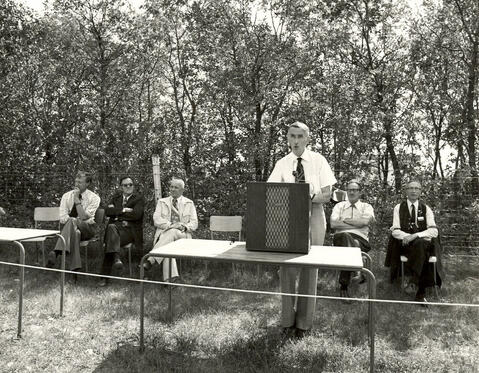
Title and statement of responsibility area
Titel
Veterinary Infectious Disease Organization - Ceremony
Algemene aanduiding van het materiaal
- Graphic material
Parallelle titel
Overige titelinformatie
Title statements of responsibility
Titel aantekeningen
Beschrijvingsniveau
Stuk
archiefbewaarplaats
referentie code
Editie
Editie
Edition statement of responsibility
Class of material specific details area
Statement of scale (cartographic)
Statement of projection (cartographic)
Statement of coordinates (cartographic)
Statement of scale (architectural)
Issuing jurisdiction and denomination (philatelic)
Datering archiefvorming
Datum(s)
-
Aug. 1976 (Vervaardig)
Fysieke beschrijving
Fysieke beschrijving
1 photograph : b&w ; 12.5 x 10cm
1 negative : 6 x 6cm
Publisher's series area
Title proper of publisher's series
Parallel titles of publisher's series
Other title information of publisher's series
Statement of responsibility relating to publisher's series
Numbering within publisher's series
Note on publisher's series
Archivistische beschrijving
Naam van de archiefvormer
Geschiedenis beheer
Bereik en inhoud
R.W. Begg, University President, speaking from podium during an outdoor ceremony marking the opening of the Veterinary Infectious Disease Organization lab. Attendees seated behind Begg are Dr. Niels O. Nielson, dean, Western College of Veterinary Medicine; W. Weir, E. Kaeding, Dr. Chris Bigland, director of VIDO; and George Shepherd.
Bio/Historical Note: The Vaccine and Infectious Disease Organization (VIDO) is a research organization of the University of Saskatchewan that operates with financial support from the Government of Canada, the government of Saskatchewan, livestock industry councils and agencies, foundations and human and animal health companies. VIDO worked to find cures for common infectious diseases in cattle, swine and poultry. VIDO scientists carved out an international reputation for their pioneering work in the 1980's on vaccines aimed at combating shipping fever and a disease which produces pneumonia and arthritis in cattle. In addition to the 2,500,000 sq ft facility on campus, VIDO-InterVac also operates a 160-acre research station. The laboratory took on its current name, International Vaccine Centre (VIDO-InterVac), in March 2003. In October 2003 a large expansion was completed. In March 2004, VIDO received funding for the construction one of the world's largest and most advanced biosafety level 3 facilities, the International Vaccine Centre (InterVac), for research into emerging and reemerging human and animal diseases. In 2020, VIDO-InterVac began developing a vaccine for SARS-CoV-2 during the COVID-19 pandemic.
Aantekeningen
Materiële staat
Directe bron van verwerving
Ordening
Taal van het materiaal
Schrift van het materiaal
Plaats van originelen
Beschikbaarheid in andere opslagformaten
Restrictions on access
Termen voor gebruik, reproductie en publicatie.
Toegangen
Associated materials
Aanvullingen
Alternative identifier(s)
Standard number area
Standaard nummer
Trefwoorden
Onderwerp trefwoord
Geografische trefwoorden
Naam ontsluitingsterm
- Begg, Robert William (Onderwerp)
- University of Saskatchewan. Veterinary Infectious Disease Organization (Onderwerp)
- BIOWEST (Onderwerp)
- BIOSTAR Inc. (Onderwerp)
- Nielsen, Niels Ole, 1930- (Professor of Veterinary Pathology) (Onderwerp)
- University of Saskatchewan. Western College of Veterinary Medicine (Onderwerp)
- Kaeding, E. (Onderwerp)
- Weir, W. (Onderwerp)
- Bigland, Dr. Chris (Onderwerp)
- Shepherd, George (Onderwerp)

